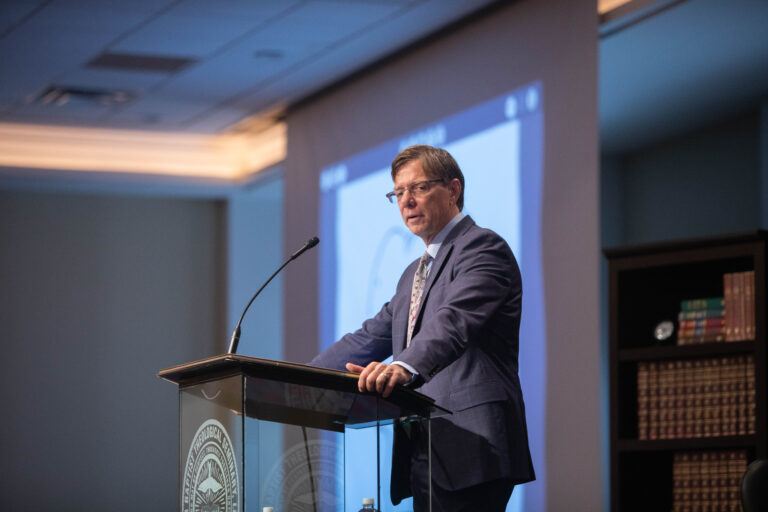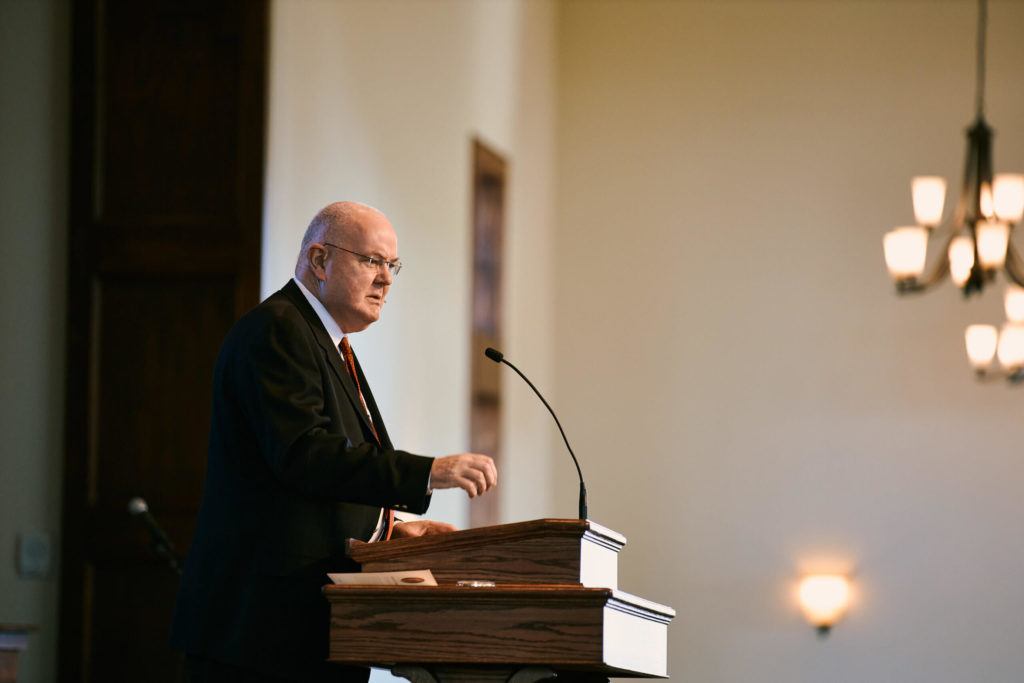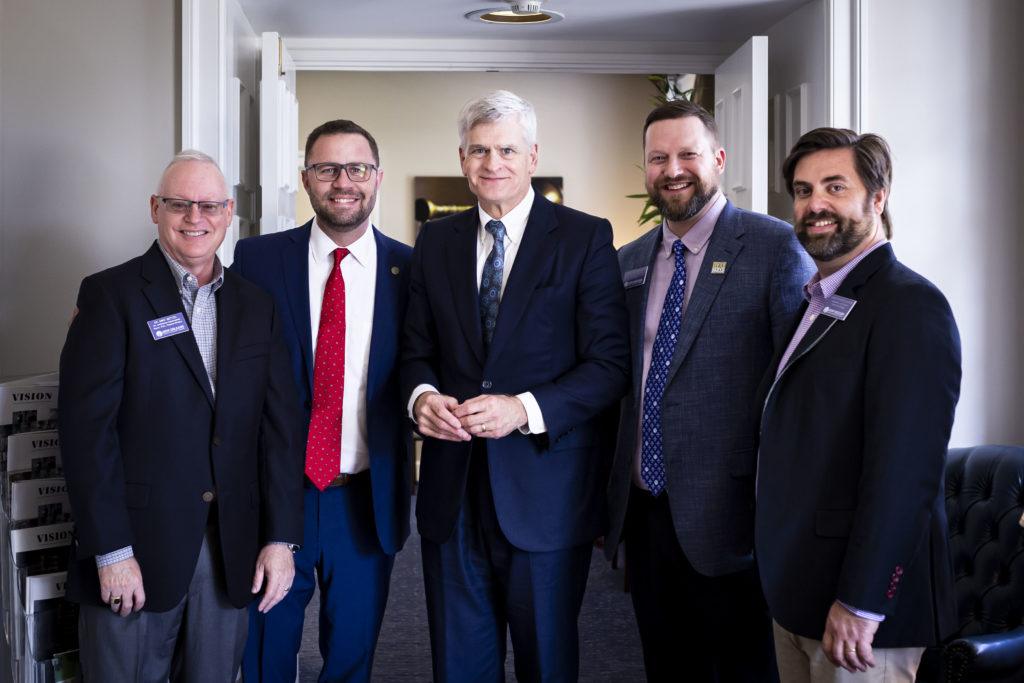 [1]
[1]‘All preaching is persuasion,’ Helm says in annual Mullins Lectures
By Travis Hearn and Jeff Robinson/SBTS
LOUISVILLE, Ky. (BP) – A faithful preacher’s role is to move from exegesis to persuasive exposition, to communicate biblical truth with clarity, and to bring credibility as a godly man to the pulpit, David Helm told attendees of the 2022 E.Y. Mullins Lectures, held Oct. 26–27 at Southern Seminary.

Helm is senior pastor of Christ Church Chicago and author of numerous books, including 1 & 2 Peter and Jude, The Big Picture Story Bible, One-to-One Bible Reading, and the 9Marks volume, Expositional Preaching.
The theme of the Mullins lectures was “Persuasive Preaching.” Helm also serves as board chairman for the Charles Simeon Trust, a ministry that encourages expository preaching and conducts preaching workshops worldwide.
“The preacher, in his preparation, is always moving from the biblical text to presenting what he has learned,” Helm said. “Only after the hard work of exegesis and theological reasoning can the preacher turn to having a word for today.”
Helm said all sermons should make an argument to persuade. The preacher isn’t simply presenting information but is calling for an obedient response. To provoke a response, however, the sermon must present a persuasive argument that is clear and rational.
“Preachers should fashion an argument that will lead the listener to a point of determination and act of the will. You must make an argument,” Helm said. “Christianity is not meant to just state things or be part of the conversation. We are actually trying to persuade people. Persuasion requires making a reasonable, accessible and delightful argument.”
According to Helm, pastors too often study the text and understand the Bible’s meaning without formulating the message into a persuasive sermon. By Sunday, preachers need to be ready to present the argument in a persuasive sermon.
“Your job isn’t to recapitulate everything you learned in your study,” Helm said. “You don’t make arguments up – you take arguments up. Your text has already made an argument to the first readers and your sermon must shape that argument for your listeners.”
Faithful preachers must also arrange their sermons in a way that is easy for hearers to follow with a clear introduction, main portion, and conclusion, Helm said. The introduction and conclusion should take up about 10 percent each of the sermon, while the main body should occupy at least 80 percent of the preacher’s time, he said.
“Arrangement is best done when the outline mirrors the organization of the text,” he said. “The persuasive preacher intentionally arranges his sermon to make an argument.”
Helm defined expositional preaching as having taken place when “the shape and emphasis of the sermon is joyfully, rightly, submitted to the shape and the emphasis of the text. It’s that simple.”
Derek Thomas delivers Spurgeon Lectures
By Brett Fredenberg/MBTS
KANSAS CITY, Mo (BP) – Midwestern Seminary hosted Dr. Derek W. H. Thomas on campus for the Spurgeon Lectures on Preaching on November 1-2.

Thomas, who serves as the Chancellor’s Professor of Systematic and Pastoral Theology at Reformed Theological Seminary and Senior Minister at First Presbyterian Church in Columbia, S.C., lectured during two chapel services and joined President Jason Allen for a Q&A and luncheon.
“Having Dr. Thomas on campus to deliver our ninth annual Spurgeon Lectures was a real joy,” said President Jason Allen. “In a time of increasing pastoral cynicism and complaints of pastoral burnout, it was particularly encouraging to hear Dr. Thomas speak of the glorious reality that it is to preach God’s Word and to pastor God’s people.”
Opening lecture
Thomas’ first lecture summarized the preaching standards written by the Westminster Assembly of Divines in the Westminster Directory for Public Worship, which includes a four-page summary of the task of preaching.
He began with a focus on the qualifications for preaching. Explaining the heart of a preacher’s identity, he said, “Though Scripture refers to preachers by many words, a preacher is first and foremost a workman.”
The next section continued with the preacher’s qualifications of giftedness and holiness. If a preacher is not gifted to preach, he said, then he is not fit for the ministry. He also stressed the importance of holiness in the life of the preacher, saying, “Make sure the text speaks to you first.” He referenced Robert Murray M’Cheyne, “The greatest need of my people is my own personal holiness.”
He also addressed the nature of preaching in his opening lecture, noting the importance of expounding the text and preaching expositionally, but he also reminded the audience of the need to expound the congregation and preach directly to the needs of the people in each congregation.
Thomas’ final point focused on principles of preaching from the Westminster Divines. In this section, he mentioned several key ideas on the preaching task including the need for balance in Scripture selection, order of the sermon outline, doctrinal preaching, the need for a main point and humility in the task.
“There’s nothing like the calling to be a preacher,” Thomas said in concluding his first lecture. “What a privilege it is for a sinner to be called to be an ambassador for Christ in the kingdom of God.”
Following the lecture, Thomas joined President Allen for a Q&A and luncheon with students, staff and faculty.
U.S. Sen. Bill Cassidy finds faith connection at visit to NOBTS
By Joseph Duke/NOBTS

NEW ORLEANS (BP) – U.S. Senator Bill Cassidy visited with President Jamie Dew and other seminary administrators at New Orleans Baptist Theological Seminary and Leavell College, Oct. 31.
“We are incredibly grateful that Sen. Cassidy took the time to come to our campus, meet us, and see who we are,” Dew said. “It is not often that someone of his rank would have the interest in what we do, but we are honored by him and are grateful for his leadership in our state and country.”
During the visit, Cassidy and Dew discussed future opportunities and challenges facing NOBTS, including providing well-rounded training for ministers in the 21st century. In the meeting, Dew explained, “We are seeking to just be faithful in the work God has given us to do.”
The visit included a tour of the NOBTS campus where Dew shared a brief history of NOBTS and his vision for the future.
Cassidy noted that he had long heard of the seminary and was grateful for the chance to visit.
“This seminary is a blessing to New Orleans and the wider region,” Cassidy said. “Their work to spread the gospel will make our communities better places to live.”
As the visit concluded, Cassidy and Dew discovered their shared interest in Mark 10:45, a verse that each uses to lead their respective teams.
“It is evident that Sen. Cassidy has a very real and genuine faith in Christ,” Dew said. “We are grateful to see that.”
